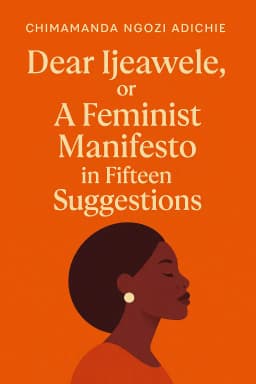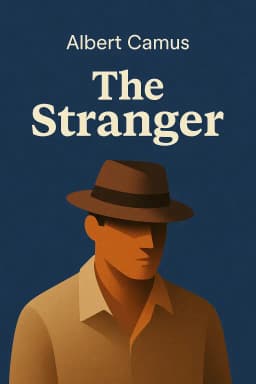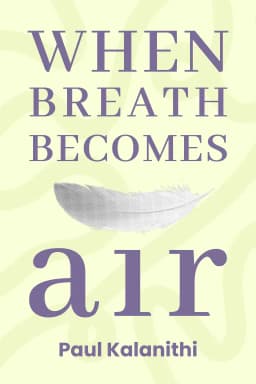
The Zombie in Your Head
In Search of a Fundamental Theory
Golden Hook & Introduction
SECTION
Michael: Most of us believe science is on the verge of explaining everything. But what if the single most obvious thing in our lives—our own consciousness—is something our current science can never explain? Not because it's hard, but because it might not be physical at all. Kevin: Whoa, that's a big claim to start with. You're saying my thoughts, my feelings, the experience of seeing the color blue... that isn't just a bunch of neurons firing in my brain? That's the standard story, right? Brain chemistry and electrical signals. Michael: That's the standard story, and it's a good one, but it might be missing the main character. Today we are diving into a book that threw a philosophical grenade right into the middle of that consensus. It's The Conscious Mind: In Search of a Fundamental Theory by David J. Chalmers. Kevin: I’ve heard this name. He’s a giant in this field, right? Michael: He is now, but what’s fascinating is that he wrote this book as a very young philosopher, basically as his PhD dissertation in the mid-90s. At the time, the dominant view in cognitive science and philosophy was materialism—the idea that everything, including the mind, is purely physical. And Chalmers, this brilliant upstart, comes along and argues, with incredible rigor, that they're all wrong. Kevin: I love a good underdog story. A PhD student taking on the entire scientific establishment? That takes guts. So what was his big argument? Where does he even begin to challenge something so fundamental? Michael: He begins with a simple but world-changing distinction. He splits the problem of the mind into two different categories: what he calls the "easy problems" and the one, single, "hard problem."
The 'Hard Problem': Why Your Brain Isn't Just a Wet Computer
SECTION
Kevin: Okay, "easy problems" and a "hard problem." I have a feeling his definition of "easy" is going to be a little different from mine. Michael: You can say that again. For Chalmers, the "easy problems" are still monumentally difficult for science. They include things like: How does the brain process sensory information? How does it integrate that information and use it to control behavior? How do we focus our attention or access our memories? How do we learn and speak? These are the questions that neuroscience and cognitive science are actively working on. They are, in essence, problems about function and mechanism. Kevin: Right, they're about what the brain does. Like understanding how a computer's hardware and software work together to run a program. It's incredibly complex, but it seems solvable in principle. We can map the circuits, trace the logic. Michael: Exactly. But then Chalmers asks: why should all that processing feel like anything from the inside? That is the hard problem. It’s not about what the brain does, but why it is like something to be a brain. Why is there a subjective, inner life? Why do we have what philosophers call 'qualia'—the raw feeling of pain, the taste of a strawberry, the vibrant redness of a sunset? Kevin: Huh. That's a great way to put it. The 'what it's like' part. We can explain all the mechanics of a camera, how it captures light and records data, but we can't explain why a person looking at the same scene has an experience of it. Michael: Precisely. Chalmers tells a great little story about a ringing telephone. We can give a complete scientific account of the event. A device vibrates, creating sound waves in the air. Those waves hit your eardrum, which vibrates. Nerves send electrical signals to your brain. Your brain processes these signals, identifies the pattern, and you might reach for the phone. We can explain every single step in that causal chain. Kevin: And yet... none of that explains the sound of the ring. The actual quality of that annoying, piercing noise. It doesn't seem to be a property of the airwaves or the neurons. It's just... there. In my head. Michael: That's the hard problem in a nutshell. It’s the gap between the objective, third-person story of physical processes and the subjective, first-person reality of experience. Chalmers shares another personal story about getting new glasses as a child. He had one good eye and one bad one. When he finally got glasses that corrected the bad eye, the world suddenly popped into a richer, deeper three-dimensions. He understood the physics of binocular vision, but that knowledge couldn't explain the profound, qualitative shift in his experience. Kevin: I can see that. It’s the difference between reading a description of a song and actually hearing it. The description can be perfect, listing every note and instrument, but it will never be the music. So, is Chalmers just saying it's a mystery we haven't solved yet? Michael: This is the crucial point. He's arguing it's a mystery of a completely different kind. It’s not just a gap in our current knowledge that more data will fill. He argues that you could know every physical fact about the universe—the position and state of every particle—and you still wouldn't be able to deduce the existence of consciousness. It seems to be an extra fact about the world, not one that's explained by the other facts. Kevin: That feels like a huge leap. It suggests that consciousness is somehow outside of the physical world we know. And that's a very uncomfortable idea for a scientific worldview. Michael: It is. And to convince us that this leap is necessary, he unleashes one of the most powerful and controversial thought experiments in modern philosophy.
The Zombie in the Room: A Thought Experiment to Break Your Brain
SECTION
Michael: He asks us to imagine a philosophical zombie. Kevin: A zombie? Really? We’re talking about brain-eating monsters now? This feels a bit silly for a serious philosophical argument. Michael: It's a fantastic name, but it's not a Hollywood zombie. A philosophical zombie is a hypothetical being that is physically identical to a conscious person in every single way, down to the last atom. It walks like you, talks like you, and behaves in every situation exactly as you would. Kevin: Okay, so it's a perfect physical duplicate. A clone. Michael: A perfect clone. If you prick its finger, it will pull its hand away and say "Ouch!" It will write poetry about the beauty of a sunrise, it will laugh at jokes, it will have deep conversations with its friends, and it will even sit around with other philosophical zombies and argue about the nature of consciousness. Kevin: Wait, so this zombie twin would do all of that... but what's the catch? Michael: The catch is that inside, it's dark. There is no inner experience. There is no 'what it's like' to be the zombie. It processes the information that leads to the word "Ouch," but it feels no pain. It processes the light from the sunrise, but it experiences no beauty. It's all processing, no feeling. It's a perfect simulation with no one home. Kevin: Hold on. That is a deeply unsettling idea. A person who is just an automaton, a shell, but is indistinguishable from the outside? How is that even possible? Michael: That's the million-dollar question! Chalmers' argument doesn't rest on whether zombies actually exist. It rests on whether they are logically conceivable. Is the idea of a zombie a logical contradiction, like a 'square circle' or a 'married bachelor'? Most people would say no. It doesn't seem to break any laws of logic to imagine a being that is physically identical to me but lacks my inner movie. Kevin: I guess that's true. It's weird, but it doesn't feel like a logical impossibility in the same way a four-sided triangle does. I can at least picture the concept. Michael: And if you can picture it—if a zombie world is even logically possible—then a devastating conclusion follows. It means that consciousness does not logically supervene on the physical. In simpler terms, the physical facts of the universe do not, by themselves, make consciousness a necessity. All the physical stuff could exist without any experience attached. Kevin: Wow. So the existence of my consciousness is an extra fact about me, on top of all my physical facts. It's an added ingredient. The zombie argument is a tool to isolate that ingredient and show that it's separate. Michael: You've got it. It's a conceptual argument designed to break the link of identity between brain states and conscious states. If you can have one without the other, they can't be the same thing. And if they aren't the same thing, then materialism—the theory that only physical things exist—is false. Kevin: My brain officially hurts. That's a powerful, and as I said, very creepy idea. It completely upends the way I think about myself and the world. If materialism is wrong, then what on earth is the alternative? Are we back to ghosts and souls? Michael: That's the fear, and it's why so many people resist this idea. But Chalmers has a different path forward. He doesn't want to go back to old-school, supernatural dualism. He wants to forge a new path.
Naturalistic Dualism: Is Your Thermostat a Little Bit Conscious?
SECTION
Michael: Chalmers' proposed solution is something he calls 'naturalistic dualism.' Kevin: Naturalistic dualism. That sounds like a contradiction in terms. 'Naturalistic' sounds like science, 'dualism' sounds like spirit. How does he put those two together? Michael: He argues that we need to expand our view of what's 'natural.' He suggests that consciousness is a fundamental property of the universe, just like spacetime, mass, or electrical charge. It's not something that can be broken down or explained in terms of simpler things. It's a basic building block of reality. Kevin: Okay, so it's not supernatural, it's just a part of nature we haven't properly identified yet. Like how in the 19th century, electromagnetism seemed mysterious until Maxwell came along and wrote down the fundamental laws that govern it. Michael: That is the exact analogy Chalmers uses! He says we are in a pre-Maxwellian stage when it comes to consciousness. Our job as scientists and philosophers is to search for the fundamental 'psychophysical laws' that connect the physical properties of systems with the phenomenal properties—the conscious experience. A law that would tell us why and how a certain brain organization gives rise to the experience of red. Kevin: A new science of consciousness. I like the sound of that. It's ambitious. But if consciousness is a fundamental property, where is it? Is it only in complex things like brains? Michael: This is where the theory takes its most speculative and, for many, its most shocking turn. Chalmers explores the idea that if consciousness is fundamental, maybe it's not restricted to biological brains. He speculates that it might be intimately tied to information. Kevin: Information? You mean like the 1s and 0s in a computer? Michael: In a sense, yes. This is a view sometimes called panpsychism. The idea is that wherever there is information processing, there is a flicker of consciousness. The more complex the information processing, the more complex the consciousness. Kevin: Pan-what? Hold on. Are you telling me my smartphone has feelings? Is my thermostat a little bit conscious? Michael: According to this view, in a very, very rudimentary way, yes. A thermostat wouldn't be worrying about its mortality or feeling existential angst. But its simple information state—flipping between 'on' and 'off'—might correspond to the most primitive, simple flicker of 'what-it's-likeness' imaginable. A single bit of experience. A rock might have virtually zero, while a mouse has a significant amount, and a human has an extraordinarily complex and rich field of consciousness. Kevin: That is... one of the wildest ideas I have ever heard. It's both absurd and strangely beautiful. The idea of a universe that is sentient at its very core, all the way down. It changes everything. It also explains why the book was so controversial. He's not just tweaking the edges of science; he's proposing a whole new reality. Michael: He is. And he's open about how speculative this part is. But he argues it's a more honest and promising path than either pretending the hard problem doesn't exist, or giving up and calling it an unsolvable mystery. He wants to build a new, bigger science that has a place for the most obvious thing in the world: our own experience.
Synthesis & Takeaways
SECTION
Kevin: Okay, let me try to wrap my head around this journey. We start with the 'hard problem'—the raw feeling of being 'me' is the real mystery, not the brain's mechanics. Then, the philosophical zombie thought experiment shows us that this feeling can't just be a physical byproduct. And finally, the proposed solution is that consciousness is a fundamental force of nature, possibly tied to information itself, which means it could be everywhere. This is easily one of the most mind-expanding books we've ever discussed. Michael: Absolutely. And that's why The Conscious Mind had such a massive impact, especially for a book that started as a dissertation. It gave a new generation of philosophers and scientists a framework and a vocabulary to take consciousness seriously as a phenomenon in its own right, not just as a ghost in the machine or something to be explained away as an illusion. Kevin: The big takeaway for me isn't that he has all the answers. The panpsychism idea is fascinating but feels a long way from being proven. The real power is in the question he framed. He drew a line in the sand and said, "This thing—subjective experience—is real, and our current theories can't cross this line." Michael: That's the perfect summary. He forces you to confront the mystery, not ignore it. The book's legacy isn't a final theory; it's a profound and enduring problem. It reframes the search for who we are. It’s not just about understanding the machine of the body, but about understanding the nature of experience itself. Kevin: It really makes you look at the world differently. You start wondering about the inner lives of animals, of future AI... of everything. It's a profound shift in perspective, from seeing a world of objects to seeing a world potentially shimmering with experience. Michael: It is. And it leaves us with a beautiful, open question. The quest for a theory of consciousness is one of the last great adventures for science. So we'd like to invite our listeners to reflect on that: what does your own consciousness feel like to you? What is the quality of your own inner world? We'd love to hear your thoughts and continue the conversation with the Aibrary community. Kevin: This is Aibrary, signing off.









